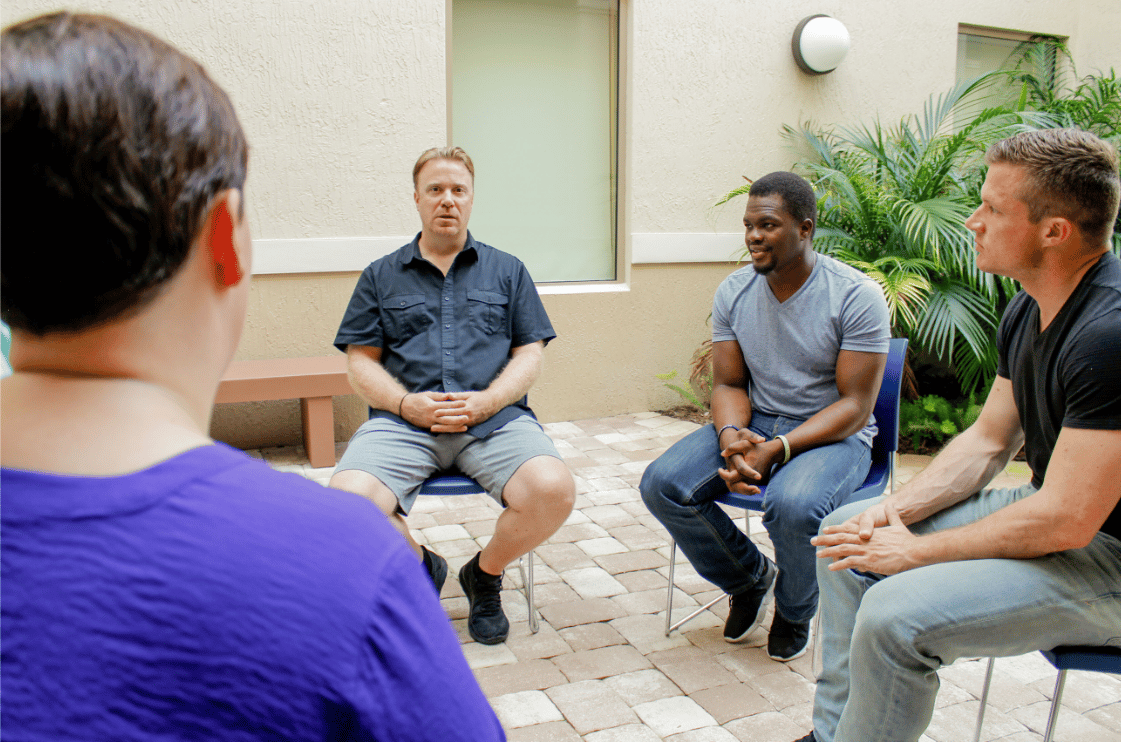Post Trauma Retreat Overview
Retreat Behavioral Health’s post trauma retreats are a haven of hope and healing for those grappling with PTSD. Learn more about our services.
How is PTSD Treated?
PTSD (Post Traumatic Stress Disorder) is much more treatable than ever before. Part of that comes from the reduced stigma around the disorder and a greater understanding of how trauma affects and rewires the brain. We help patients find relief by deploying a range of techniques: Yoga, meditation, art therapy, and other modalities of self-care can boost the productivity of other treatments and help patients find peace sooner.
Understanding other side effects that PTSD can produce, such as substance use, depression, panic attacks, or the like, is equally at the heart of our treatments. If we observe that a patient demonstrates these behaviors, we unpack them through clinical approaches that help us enable the patient to address the source of their PTSD, and come to terms with it.

What is PTSD?
PTSD, which stands for post-traumatic stress disorder, is a psychiatric disorder in which an individual has trouble recovering mentally and emotionally after a traumatic event. There are more than 3 million diagnosed cases of PTSD a year, and the condition may last for months — or even years — following the triggering event.
It is important to note that PTSD is different from just feeling afraid or anxious. PTSD is incredibly debilitating, with feelings often growing in intensity over time and failing to abate without proper medical intervention. PTSD is commonly seen in individuals who have experienced war (either as a member of the military or as a citizen), those who have been the victims of assault, and those who work in close proximity to violence, such as police officers and emergency personnel.
Symptoms of PTSD
Effective PTSD treatment and trauma recovery starts with correctly identifying the symptoms of PTSD. The disorder may present itself differently in different people, but general symptoms include:
- Behavioral symptoms, such as irritability, quickness to anger, hostility, emotional-detachment, and social isolation.
- Sleep symptoms, including insomnia and nightmares.
- Mood symptoms, such as expressions of guilt, paranoia, and loss of interest in activities and/or relationships that once brought joy.
- Psychological symptoms, such as extreme anxiety, worry, and fear.
Those with PTSD may also experience flashbacks of the event, which can temporarily heighten the symptoms above.
How to Treat PTSD in Children
PTSD treatment centers and programs are not solely for adults. Children, too, can and do experience PTSD, often from seeing violence in the home or school.
Treatment for PTSD in children includes trauma-focused cognitive behavioral therapy, which uses a traditional CBT approach combined with trauma-specific modalities to help children feel safe, build coping skills, and create a narrative of their trauma that they can then safely work through with a mental health professional.
What is the Best Treatment for PTSD?
There is no one treatment that is successful in treating all PTSD, but there are certain treatments that have proven more effective than others. Upon the PTSD diagnosis, which is done through the use of a physical exam and psychological evaluation, treatment commences with talk therapy, also called psychotherapy.
Psychotherapy can take different forms. For those with PTSD, psychotherapy can include CBT, EMDR (eye movement desensitization and reprocessing), and exposure therapy, wherein an individual faces the trauma head-on in a safe setting.
In addition to psychotherapy, many PTSD patients also benefit from the use of medications such an antidepressants or anti-anxiety medications.
PTSD Treatment Centers in Florida, Connecticut, and Pennsylvania
It is important for those with PTSD to know that they do not have to suffer alone and that there is hope for a life without the disorder. At Retreat Behavioral Health, we have several PTSD treatment facilities that work with individuals through their traumas safely and effectively as they overcome PTSD.
If you or a loved one is suffering from PTSD, we encourage you to reach out for help. Please contact us at 855.859.8810 to learn about our individualized PTSD treatment in Florida, Connecticut, and Pennsylvania and how we can help you find a path to a brighter future.
Today’s Programs for PTSD
Patients come to us asking, “Can you overcome PTSD?” c. Part of that comes from the reduced stigma around the disorder and a greater understanding of how trauma affects and rewires the brain.
Along with standard PTSD treatments, many patients today also find relief through programs for PTSD that include holistic treatment practices. Yoga, acupuncture, massage, and other modalities of self-care can boost the productivity of other treatments and help patients find peace sooner.
Call (855) 859-8808 for direct assistance

